FAQ: Who Qualifies for the Instagram Addiction Lawsuit?
- Last Updated: June 12th, 2025

Attorney Jessica Paluch-Hoerman, founder of TruLaw, has over 28 years of experience as a personal injury and mass tort attorney, and previously worked as an international tax attorney at Deloitte. Jessie collaborates with attorneys nationwide — enabling her to share reliable, up-to-date legal information with our readers.
Legally Reviewed
This article has been written and reviewed for legal accuracy and clarity by the team of writers and legal experts at TruLaw and is as accurate as possible. This content should not be taken as legal advice from an attorney. If you would like to learn more about our owner and experienced injury lawyer, Jessie Paluch, you can do so here.
Fact-Checked
TruLaw does everything possible to make sure the information in this article is up to date and accurate. If you need specific legal advice about your case, contact us by using the chat on the bottom of this page. This article should not be taken as advice from an attorney.
Key takeaways:
- The Instagram addiction lawsuit focuses on teens and young adults, who are more likely to get hooked on Instagram's design features.
- U.S. State's Attorneys want to show that Instagram knew about these potential harms but didn't do enough to stop them, putting many young users at risk.
- Individuals who have experienced self-harm or suicidal ideation as a result of social media addiction may have a strong case in the lawsuit.
Who Qualifies for the Instagram Addiction Lawsuit? Let's Discuss
Question: Who qualifies for the Instagram Addiction Lawsuit?
Answer: To qualify for the Instagram Addiction Lawsuit, an individual or their child may need to establish that they may be addicted to using social media, particularly Instagram, and have suffered physical or psychological harm as a result of this addiction.
Intro to the Instagram Addiction Lawsuit
On this page, we’ll discuss this question in further depth, an overview of the Instagram Addiction Lawsuit, potential impacts of social media addiction, and much more.
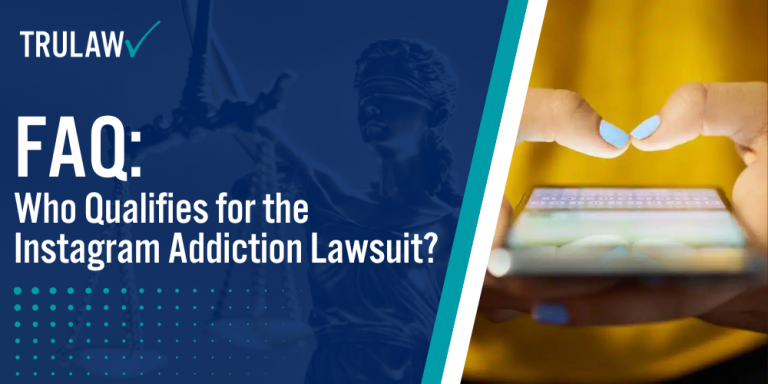
The Instagram addiction lawsuit seeks to hold Meta (the parent company of Instagram) accountable for the harmful effects of addiction, including mental health issues.
Individuals who qualify for the Instagram Addiction lawsuit are typically:
- Individuals who qualify for the Instagram Addiction lawsuit are typically
- Became addicted to social media before the age of 21
- Experienced psychological or physical harm as a result of their addiction
If you or a loved one has suffered from mental health issues as a result of using these platforms, contact TruLaw using the chat on this page to receive an instant case evaluation today.
Table of Contents
Understanding the Instagram Addiction Lawsuit
Social media addiction, particularly on platforms like Instagram, has sparked a wave of legal actions due to its profound impact on users’ mental health, especially among adolescents and young adults.
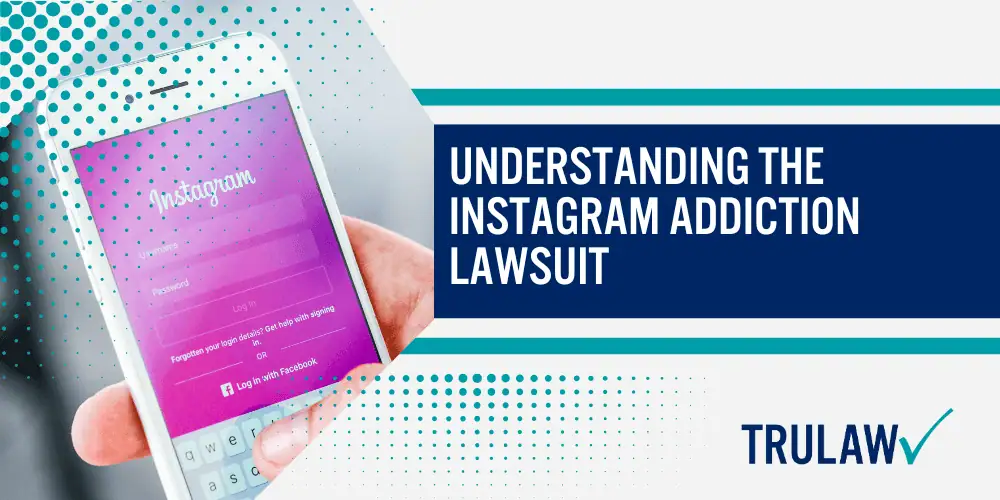
This behavioral dependency is characterized by an intense urge to stay engaged with social networking sites, often resulting in significant distress or impairment in various aspects of life.
Defining Instagram Addiction and Its Symptoms
Social media addiction is a severe behavioral condition marked by an overwhelming compulsion to engage with platforms such as Instagram.
Users may experience the following symptoms including, but not limited to:
- Anxiety and depression when not using the app
- Neglect of personal and professional responsibilities in favor of social media use
- A decline in real-life social interactions
- Mood swings tied to online interactions
- Physical symptoms like headaches from excessive screen time or sleep disturbances
This addiction can lead to long-term psychological issues, including low self-esteem, body image concerns, and an increased risk for other mental health disorders.
The Specific Concerns with Instagram Addiction
Instagram addiction stands out for its unique impact on young users’ mental health.
The platform’s design, featuring infinite scrolling and attention-grabbing notifications, taps into users’ innate desire for social approval, potentially leading to addictive behavior patterns.
Studies have linked Instagram use to various emotional harm symptoms, including anxiety, depression, and self-esteem issues.
Instagram Addiction Lawsuit: Legal Perspective
The Instagram addiction lawsuit against Meta Platforms (formerly Facebook) and Instagram highlights the growing concern over the platforms’ influence on mental health.
Internal research leaked from Meta suggests an awareness of the harmful effects on children’s mental health, raising questions about the company’s responsibility toward its young users.
The Instagram addiction lawsuit aims to hold social media companies accountable for the adverse psychological outcomes stemming from excessive use of their platforms, advocating for justice for those affected and a reevaluation of how social media interfaces with youth mental health.
Rising Reports in the Instagram Addiction Lawsuit
The increasing popularity of Instagram has brought with it a heightened awareness of its potential harms, particularly concerning mental health issues in teens.
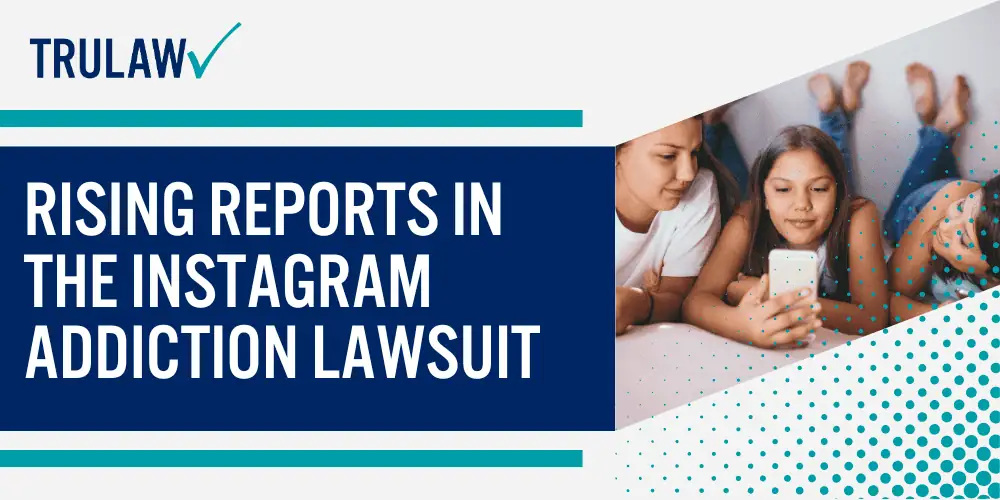
This has led to a significant rise in reports of injuries in the Instagram addiction lawsuit, particularly following the leak of internal Facebook (now Meta) documents.
Overview of the Instagram Addiction Lawsuit
The Instagram addiction lawsuit claims that the app has been intentionally designed to foster addiction, particularly among young users.
The primary concerns of the litigation against Instagram include:
- Exploitation of users’ biological drive for social interaction
- Contributing to mental health issues like anxiety, depression, and low self-esteem among teens
- Continued targeting of young users despite awareness of negative impacts
This lawsuit represents a critical stance against social media companies prioritizing profits over the well-being of young users, demanding accountability for the youth mental health crisis linked to these platforms.
Criteria for Joining the Instagram Addiction Lawsuit
The Instagram addiction lawsuit is a pivotal move in holding major social media platforms accountable for their impact on young users’ mental health.
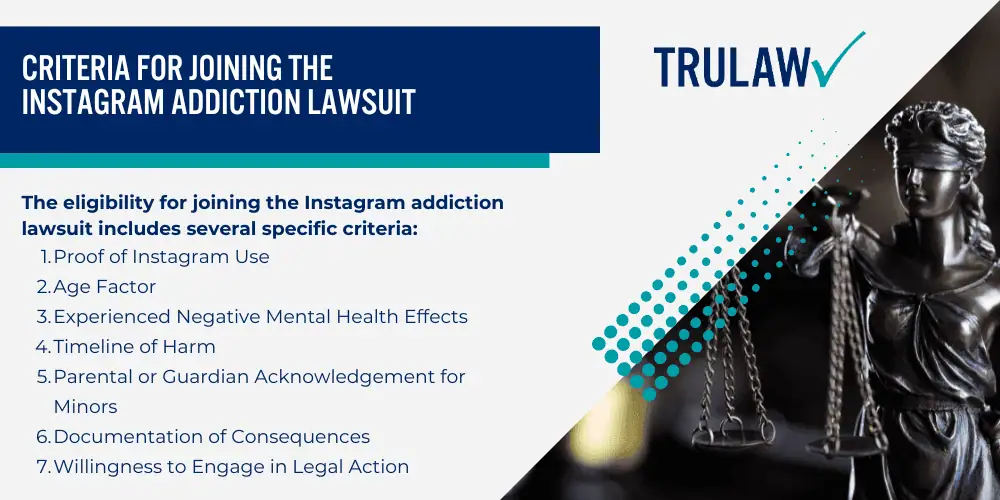
The eligibility for joining the Instagram addiction lawsuit includes several specific criteria:
- Proof of Instagram Use: Participants must show active and consistent use of Instagram.
- Age Factor: The lawsuit targets young users, focusing on teens and young adults.
- Experienced Negative Mental Health Effects: Claimants must provide evidence of adverse mental health impacts due to Instagram use, such as depression, anxiety, or self-esteem issues.
- Timeline of Harm: There should be a clear link between the period of Instagram use and the onset of mental health problems.
- Parental or Guardian Acknowledgement for Minors: For minors, a parent or legal guardian must recognize the harm and consent to participate in the lawsuit.
- Documentation of Consequences: Evidence of specific consequences of Instagram use, like relationship struggles, academic performance issues, or overall well-being challenges, is required.
- Willingness to Engage in Legal Action: Participants must be committed to joining the class action lawsuit and following through with the necessary legal processes.
Impact of Instagram on Youth Mental Health
Recent studies by the Pew Research Center reveal that heavy reliance on visual-centric platforms may contribute to unhealthy social media use, where users evaluate themselves against idealized content.
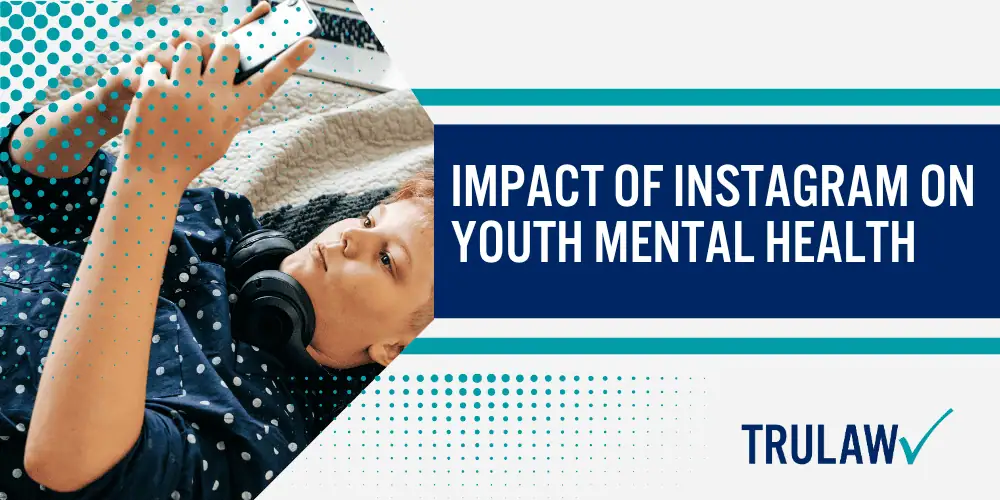
Instagram’s design features—such as likes, comments, and followers—have become key metrics for teens evaluating their own life success and popularity; this can exacerbate feelings of inadequacy or exclusion.
Instagram’s Mental Health Effects
The Wall Street Journal has highlighted how these elements create an environment where kids’ well-being is compromised due to the constant pressure to post idealized content that receives validation from peers.
These mental health challenges are more pronounced in youth who spend long hours curating their online presence.
Instagram, with its focus on visual content, can significantly affect teens’ self-esteem issues.
Scrolling through idealized content often leads to evaluating oneself against unrealistic standards of beauty and lifestyle.
Instagram’s visually-focused content significantly impacts teens’ self-perception and social interactions, often resulting in:
- Self-Esteem Issues: Constant exposure to idealized images can lead to feelings of inadequacy and lowered self-esteem.
- Social Anxiety: The pressure to maintain a particular online image and the fear of missing out can heighten social anxiety.
- Depression and Self-Harm: Research links prolonged Instagram use to increased rates of depression, self-harm, and suicidal thoughts among teens.
- Eating Disorders: There’s a noted association between Instagram use and the risk of developing eating disorders, particularly in girls.
- Sleep Disturbance: Excessive nighttime use of Instagram disrupts sleep patterns, leading to insomnia and impaired daily functioning.
- Addiction and Overuse: Features like likes and comments exploit teens’ biological drive for social approval, fostering addictive behaviors.
- Impaired Social Skills: Over-reliance on digital interactions can diminish real-life social skills and communication abilities.
- Academic Interference: High engagement with Instagram during school hours can detract from academic focus and performance
Teens who spend hours on Instagram might find themselves battling negative thoughts about their lives as they contrast them with the perfected images they see.
Extended use of this preferred platform has also been linked to Instagram mental health concerns, including depression and self-harm.
Users evaluate their popularity based on likes and comments, driving a user’s biological drive for social approval into overdrive.
Mental Health Research Studies: Instagram Addiction
Research studies have uncovered a troubling connection between the use of Instagram and mental health issues in teens.
These investigations highlight the need for age-appropriate standards in social media usage:
- Correlation with Depression and Anxiety: Studies suggest that teens who spend more time on Instagram report higher levels of depression and anxiety. The constant comparison with others can lead to self-esteem issues, as users contrast their own lives with the carefully curated images of peers.
- Association with Eating Disorders: Evidence links Instagram use to an increased risk of eating disorders among teenagers, especially girls. The platform’s emphasis on visual appeal and body image can exacerbate pre-existing concerns about weight and appearance.
- Impact on Sleep Patterns: Excessive use of social media platforms, including Instagram, is associated with poor sleep quality. Teens who regularly engage with these apps at night may experience insomnia, disrupting their ability to function well during the day.
- Contribution to Self-Harm and Suicidal Thoughts: Instagram has been linked to alarming rates of suicidal thoughts and behaviors among young users. The raw time spent scrolling through feeds full of idealized lives can make vulnerable teens feel isolated or inadequate.
- Addictive Design Features: Psychologists recognize that certain features within many apps teens prefer are designed to exploit users’ biological drives for social interaction and self-expression, making it hard for them to disconnect or even switch into airplane mode voluntarily.
- Adverse Effects on Social Skills: As kids invest more time in virtual interactions, real-life social skills may suffer. Friends become digital entities rather than partners in face-to-face adventures; this shift might limit kids’ ability to communicate effectively offline.
- Change in Preferred Platforms and Behaviors: Research shows that as new platforms gain or lose traction, teens migrate accordingly—yet the underlying patterns remain extremely common across various apps, suggesting a broader issue within social media.
- Influence on Academic Performance: Excessive engagement with apps like Instagram during school hours has led some districts to question if unfollowing people or limiting app access might bolster academic focus against the distraction these platforms provide.
How Instagram’s Algorithm Targets Teens
Instagram’s design cleverly taps into teens’ cravings for social interaction and self-expression.
The platform offers a range of features that resonate with young users, from aesthetically pleasing filters to the ability to share their lives through stories and posts.
These elements foster an environment where kids can showcase their identity and creativity, making Instagram one of the most preferred platforms for this age group.
The application also exploits users’ biological drive for social approval, using algorithms that promote content based on likes and comments.
This can intensify peer pressure and create a loop where teens are constantly checking for updates, fearing they might miss out if they consider leaving one’s phones aside.
As a result, these design choices encourage prolonged use and deepen engagement, which has linked Instagram with various mental health concerns in teenagers, such as self-esteem issues related to their well-being.
Legal Actions Against Social Media Companies
Social media platforms have become an integral part of our lives, connecting us with friends, family, and information worldwide.
However, concerns have emerged regarding the potential harm caused by these platforms, particularly to young users.
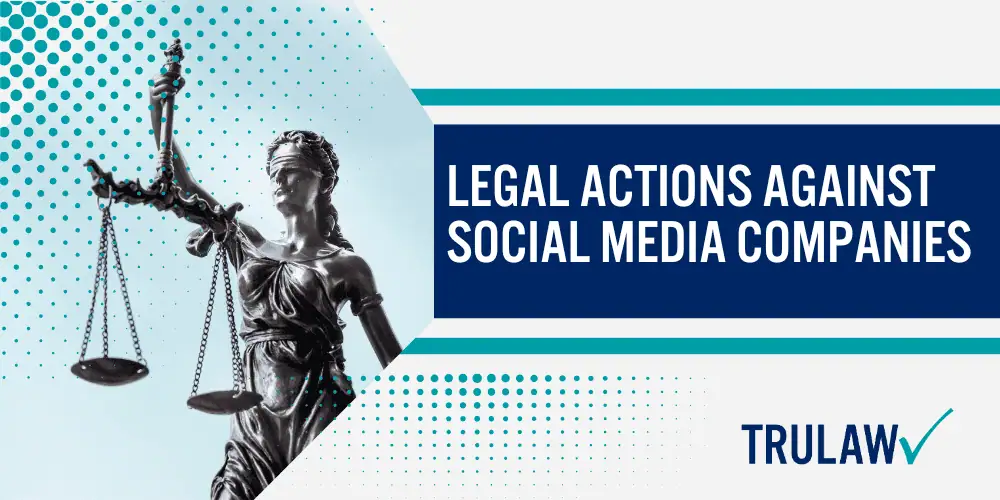
If you or a loved one has suffered from mental health issues as a result of using these platforms, contact TruLaw using the chat on this page to receive an Instagram addiction lawsuit evaluation today.
Seeking Justice and Accountability for Harm Caused
Victims of Instagram addiction now have a path to hold the platform accountable for its design choices and potential damages.
As mental health effects from social media soar, especially among teens, these lawsuits serve as pivotal movements toward ensuring age-appropriate experiences on preferred platforms like Instagram.
By filing a case, affected individuals aim to push for recognition of the harm caused and advocate for better protection standards against user’s biological drive for endless scrolling and engagement that can lead to self-esteem issues.
The role of these legal actions goes beyond individual redress; they signal to other social media companies the urgent need for change in how they target young users.
School districts, parents, and lead lawyers representing cases in federal court all play crucial roles in this fight.
They seek not only compensation but also measures that prevent further damage by enforcing age-appropriate standards across social media adolescent addiction arenas.
This process is an essential step towards mitigating negative impacts on kids’ well-being and fostering healthier environments for self-expression online.
The Role of the Instagram Mental Health Lawsuit in This Process
The Instagram addiction lawsuit serves as a crucial step in holding social media companies accountable for the harm caused to teens’ well-being and self-esteem.
It highlights how platforms like Instagram can exploit users’ biological drive for social interaction, often leading to addiction and self-harm among impressionable young people.
By pursuing legal action, this lawsuit aims to enforce age-appropriate experiences on preferred platforms and ensure safer online environments for self-expression.
This ongoing battle in courtrooms underscores the need for systemic change within the industry.
If successful, it could set a precedent that forces other social media platforms to reevaluate their practices and prioritize kids’ well-being over profit.
Through these lawsuits, participants seek not just individual compensation but also broader societal shifts that recognize the gravity of social media harm – ushering in an era where people engage with technology without compromising their mental health.
Who Qualifies For The Instagram Addiction Lawsuit?
Understanding whether you or your child fits within these parameters is crucial for those impacted by Instagram’s potentially harmful effects and seeking accountability from social media giants.
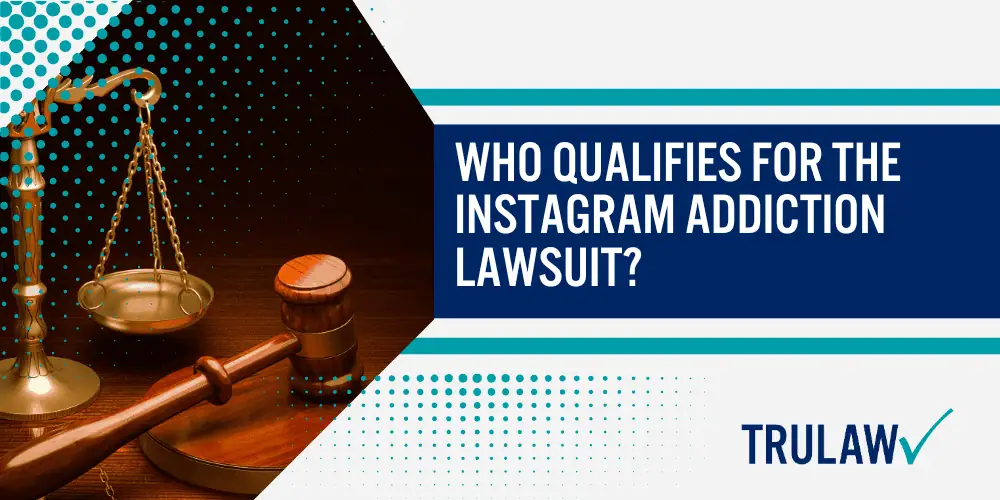
Eligibility for teens and their parents/legal guardians
Eligibility for teens and their parents or legal guardians is a critical aspect of the Instagram addiction lawsuit.
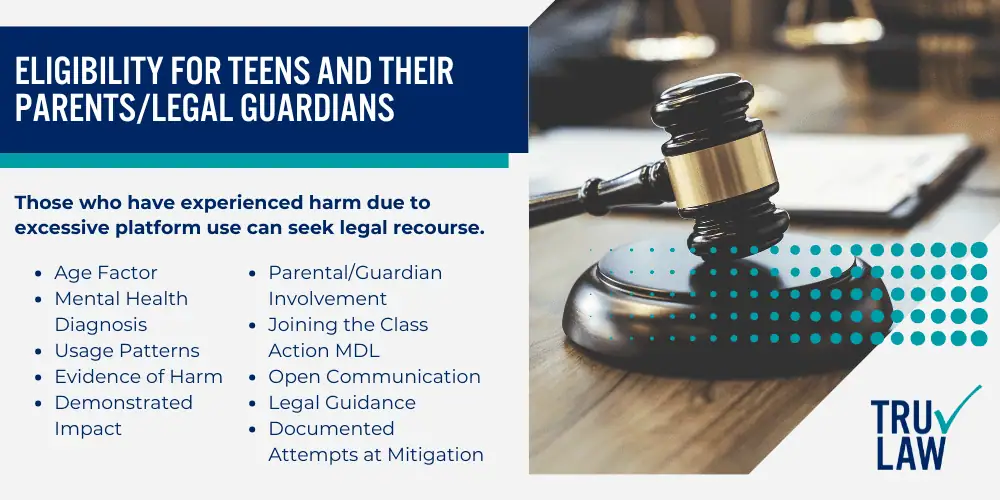
Those who have experienced harm due to excessive platform use can seek legal recourse.
- Age Factor: Teens must typically be under 18 when filing to be part of the lawsuit. This aligns with seeking age-appropriate experiences on social media platforms.
- Mental Health Diagnosis: A diagnosis related to mental health issues, such as self-esteem problems, is often required. This should ideally be linked to Instagram use.
- Usage Patterns: Excessive time spent on Instagram that correlates with the onset of mental health symptoms can indicate eligibility for joining lawsuits targeting social media harm.
- Evidence of Harm: Documented evidence proving that Instagram contributed to self-harm or deterioration in kids’ well-being strengthens a case’s eligibility.
- Demonstrated Impact: A clear impact on the teen’s social relationships, academic performance, or psychological state due to Instagram usage solidifies eligibility grounds.
- Parental/Guardian Involvement: Parents or legal guardians must usually file on behalf of their minor children and show how their child’s preferred platforms change behavior negatively.
- Joining the Class Action MDL: Understanding and following the Multi-District Litigation (MDL) process for class action lawsuits focused on social media harm is essential for proper inclusion.
- Open Communication: Filing requires open-ended questions about the teen’s social media makes—how it influences their self-expression and day-to-day life.
- Legal Guidance: Engaging experienced attorneys familiar with social media lawsuits ensures accurate representation and navigation through complex legal systems.
- Documented Attempts at Mitigation: Proof that attempts were made to reduce harmful exposure, such as implementing screen time limits, can bolster an individual’s case for inclusion in the lawsuit.
If you or a loved one has suffered from mental health issues as a result of using these platforms, contact TruLaw using the chat on this page to receive an Instagram addiction lawsuit evaluation today.
Signs and Consequences of Instagram Addiction in Teens
Understanding these symptoms empowers parents to respond proactively before lasting harm takes hold.
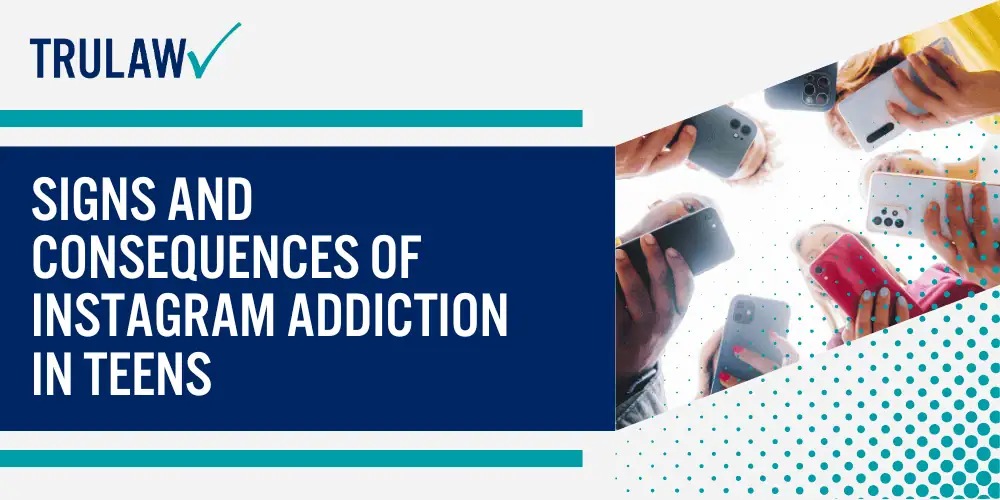
Recognizing Social Media Addiction
Recognizing addiction to Instagram can be challenging, but there are clear signs that might indicate a teen is struggling.
Frequent and prolonged app use that disrupts daily life, such as skipping meals, losing sleep, or neglecting schoolwork, could signal an issue.
Teens may also experience self-esteem issues if they’re overly concerned with likes and followers or feel intense distress when unable to access Instagram.
Another telling sign is a change in behavior linked to their social media habits.
This includes teens becoming irritable or anxious when not using the platform or consistently choosing time on Instagram over age-appropriate experiences like interacting face-to-face with friends or engaging in sports and hobbies.
If you or a loved one has suffered from mental health issues as a result of using these platforms, contact TruLaw using the chat on this page to receive an Instagram addiction lawsuit evaluation today.
Mental Health Effects of Instagram Addiction
Instagram addiction can take a heavy toll on teens’ social lives and academic success.
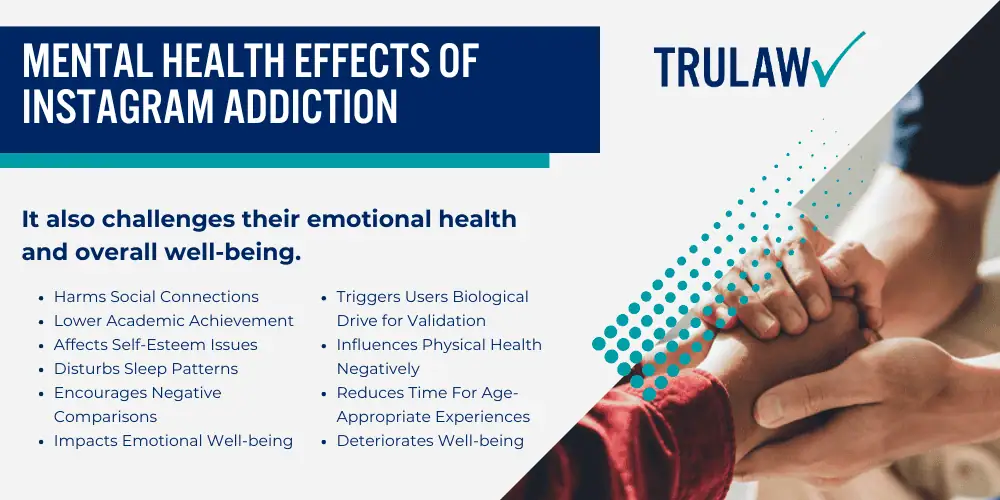
It also challenges their emotional health and overall well-being.
- Harms Social Connections: Teens invested in Instagram often replace real-world interactions with online ones, which may weaken face-to-face communication skills and reduce a sense of community.
- Lower Academic Achievement: As stated earlier, there’s a significant decline in school performance among youths addicted to Instagram; they spend hours scrolling instead of studying.
- Affects Self-Esteem Issues: Constant exposure to idealized images on Instagram can make teens feel inadequate, feeding into severe self-esteem problems and self-doubt.
- Disturbs Sleep Patterns: The urge to stay updated means teens are likely to use Instagram late into the night, disrupting healthy sleep cycles that are essential for growth and learning.
- Encourages Negative Comparisons: Scrolling through curated posts can result in detrimental comparisons with peers, escalating feelings of jealousy and dissatisfaction.
- Impacts Emotional Well-being: The pressure for likes, comments, and followers on Instagram can lead to stress and anxiety over self-expression and online presence.
- Triggers Users Biological Drive for Validation: Instagram’s design taps into the biological drive for social approval, leading to an addictive loop of seeking validation through digital engagements.
- Influences Physical Health Negatively: Excessive screen time is associated with sedentary behavior, which can contribute to physical health issues like obesity or eye strain.
- Reduces Time For Age-Appropriate Experiences: Teens miss out on age-appropriate offline experiences that aid development because they’re caught up in the virtual world of Instagram.
- Deteriorates Well-being: With energy focused on managing an online persona, kids’ well-being suffers as meaningful hobbies, family time, or relaxation take a backseat.
Addressing the Instagram Addiction Lawsuit Against Meta Platforms
This legal action particularly scrutinizes the role of Meta’s platforms, such as Instagram, in fostering potentially addictive behaviors.
Your eligibility for this lawsuit begins with assessing how Instagram and other Meta platforms have influenced your life or that of a young person for whom you are responsible.
If you find that these social media landscapes have entrapped you or someone you care for in addictive patterns, the Instagram addiction lawsuit could represent an opportunity for healing and societal change.
Engaging with experienced attorneys is crucial for navigating the complexities of suing Meta Platforms.
If you or a loved one has suffered from mental health issues as a result of using these platforms, contact TruLaw using the chat on this page to receive an instant case evaluation today.
By taking action in the Instagram addictio lawsuit, you’re seeking justice for personal grievances and contributing to a broader movement towards more ethical practices in social media.
Social Media Harm Lawsuits Frequently Asked Questions
-
What is the Instagram addiction lawsuit?
The Instagram addiction lawsuit refers to the legal action taken by forty-one states and Washington D.C. against Meta, the parent company of Instagram and Facebook.
The lawsuits allege that these platforms are addictive and have a detrimental effect on children’s mental health and call for civil penalties, changes in Meta’s business practices, and restitution.
-
Who can join the Instagram addiction lawsuit?
The Instagram addiction lawsuit seeks to address these issues and provide compensation for affected individuals, particularly those who began their addiction before the age of 25.
If you or a loved one has suffered from mental health issues as a result of using these platforms, contact TruLaw using the chat on this page to receive an instant case evaluation today.
-
Can I file an Instagram addiction lawsuit on behalf of my child?
Yes, you may be eligible to file a lawsuit for social media addiction, including Instagram, on behalf of your child.
This is especially relevant if your child began using the platform under the age of 25 and has suffered physical or mental harm as a result of the addiction.
-
Can minors directly apply to be a part of the Instagram Addiction Lawsuit?
In the context of the ongoing Instagram addiction lawsuit, minors typically cannot directly initiate or apply to join the lawsuit on their own.
Legal actions involving minors usually require representation through a parent or legal guardian.
The guardian acts on behalf of the minor in legal proceedings, including lawsuits against social media companies.
If you or a loved one has suffered from mental health issues as a result of using these platforms, contact TruLaw using the chat on this page to receive an instant case evaluation today.
-
How do social media platforms cause physical and psychological harm?
Social media platforms can cause harm by promoting addictive behaviors, potentially leading to various physical and psychological issues such as:
- Anxiety
- Depression
- Decreased physical activity
- Disrupted sleep patterns
- Excessive use of social media
- Other adverse health effects

Managing Attorney & Owner
With over 25 years of legal experience, Jessica Paluch-Hoerman is an Illinois lawyer, a CPA, and a mother of three. She spent the first decade of her career working as an international tax attorney at Deloitte.
In 2009, Jessie co-founded her own law firm with her husband – which has scaled to over 30 employees since its conception.
In 2016, Jessie founded TruLaw, which allows her to collaborate with attorneys and legal experts across the United States on a daily basis. This hypervaluable network of experts is what enables her to share the most reliable, accurate, and up-to-date legal information with our readers!
Additional Social Media Harm Lawsuits resources on our website:
Here, at TruLaw, we’re committed to helping victims get the justice they deserve.
Alongside our partner law firms, we have successfully collected over $3 Billion in verdicts and settlements on behalf of injured individuals.
Would you like our help?
At TruLaw, we fiercely combat corporations that endanger individuals’ well-being. If you’ve suffered injuries and believe these well-funded entities should be held accountable, we’re here for you.
With TruLaw, you gain access to successful and seasoned lawyers who maximize your chances of success. Our lawyers invest in you—they do not receive a dime until your lawsuit reaches a successful resolution!
AFFF Lawsuit claims are being filed against manufacturers of aqueous film-forming foam (AFFF), commonly used in firefighting.
Claims allege that companies such as 3M, DuPont, and Tyco Fire Products failed to adequately warn users about the potential dangers of AFFF exposure — including increased risks of various cancers and diseases.
Depo Provera Lawsuit claims are being filed by individuals who allege they developed meningioma (a type of brain tumor) after receiving Depo-Provera birth control injections.
A 2024 study found that women using Depo-Provera for at least 1 year are five times more likely to develop meningioma brain tumors compared to those not using the drug.
Suboxone Tooth Decay Lawsuit claims are being filed against Indivior, the manufacturer of Suboxone, a medication used to treat opioid addiction.
Claims allege that Indivior failed to adequately warn users about the potential dangers of severe tooth decay and dental injuries associated with Suboxone’s sublingual film version.
Social Media Harm Lawsuits are being filed against social media companies for allegedly causing mental health issues in children and teens.
Claims allege that companies like Meta, Google, ByteDance, and Snap designed addictive platforms that led to anxiety, depression, and other mental health issues without adequately warning users or parents.
Transvaginal Mesh Lawsuits are being filed against manufacturers of transvaginal mesh products used to treat pelvic organ prolapse (POP) and stress urinary incontinence (SUI).
Claims allege that companies like Ethicon, C.R. Bard, and Boston Scientific failed to adequately warn about potential dangers — including erosion, pain, and infection.
Bair Hugger Warming Blanket Lawsuits involve claims against 3M — alleging their surgical warming blankets caused severe infections and complications (particularly in hip and knee replacement surgeries).
Plaintiffs claim 3M failed to warn about potential risks — despite knowing about increased risk of deep joint infections since 2011.
Baby Formula NEC Lawsuit claims are being filed against manufacturers of cow’s milk-based baby formula products.
Claims allege that companies like Abbott Laboratories (Similac) and Mead Johnson & Company (Enfamil) failed to warn about the increased risk of necrotizing enterocolitis (NEC) in premature infants.
Here, at TruLaw, we’re committed to helping victims get the justice they deserve.
Alongside our partner law firms, we have successfully collected over $3 Billion in verdicts and settlements on behalf of injured individuals.
Would you like our help?
